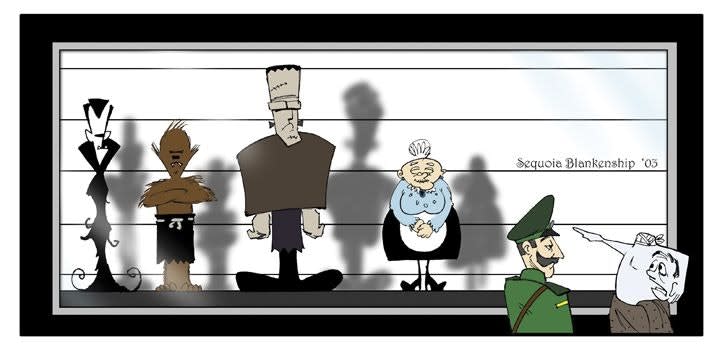Crocodile Wrestling
About a half-dozen unnamed Italian cops bravely pounced on a six-foot crocodile. They were scared stiff of being eaten, but even more afraid of the danger it could pose to the public if it got away. They all survived, thanks largely to the fact that the crocodile, although real, was stuffed.
"Which is a good thing," one of the officers told a reporter. "Because we still don't have a crocodile rapid-reaction unit."
The Carabinieri first dismissed the report of a croc sunning itself on Tiberina Island, in the Tiber River in the heart of Rome, thinking it was a hoax. Then more calls came. They sent a unit, and there he was, more than 6 feet plus of lumpy green muscle, with his enormous jaws jacked open and waiting.
Creeping up very carefully, they bounced a couple of rocks off the croc, and he didn't move. But then they were told by a naturalist that lack of reaction to things like that by a croc do not mean he's asleep, dead, or anything else. Oh, that must have been comforting. Then they learned that unless a rifle round struck the croc perfectly, he could simply swim away, wounded, irritable, and even more dangerous.
Dividing themselves up into teams-like, you two get the jaws, you get the right front leg-they jumped Toothy, probably squeezing his stuffing flat and giving themselves hernias, and after several extremely tense seconds, determined that he was an ex-snapper.
They're still looking for the joker who planted Toothy on Tiberina, presumably to explain how un-funny it was.
Dr. Frankenstein's Legend
Police around the famous-or infamous-Frankenstein Castle, near Darmstadt, Germany, have to put up with more than their fair share of weirdo monster worshipers and "horror tourists," so they try very hard to downplay the castle's reputation. That gets hard to do when naked, headless corpses turn up nearby.
The body of a nude male, missing his head, among other things, recently set off a new wave of controversy and sensationalism centered on the medieval castle.
Mary Shelley's 1818 novel "Frankenstein" is labeled "fiction," but the real Johann Konrad Dippel von Frankenstein was born there in 1673, and was known far and wide as an eccentric alchemist with an interest in artificial life and a tendency to play with detached body parts. His mysterious death in 1734 was rumored to have occurred at the hands of one of his "assembled critters," and the stage was set for a great story.
In the wake of this latest discovery, officers are keeping tight lips, only suggesting that any connection between the headless body and Frankenstein is "absurd." So far, no torch-bearing crowds have been reported down in the village, although it would certainly be a great boost for tourism.
Hashish Sushi
There's a bunch of Spanish cops in the port city of Algeciras who've most likely lost their taste for calamari. They've probably seen, felt, and waded through enough of that stuff to last 'em a lifetime.
In July's record-breaking heat, they spent their days prying an estimated 25 tons of hashish out of a huge freighter-load of rapidly defrosting frozen squid. Somehow, we don't think the honor of being in on a record hash haul made up for the squish-and-stink factor of the experience.












